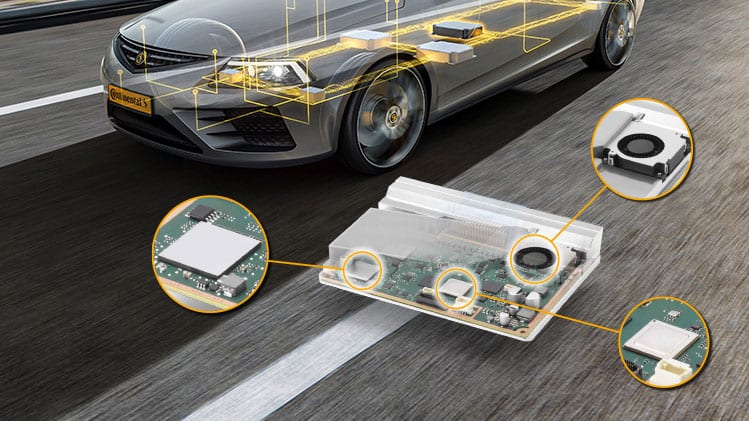In this article, we will explore some of the most promising future trends in ECU technology. That are set to revolutionize the automotive. In the rapidly evolving automotive industry. Cutting-edge Electronic Control Unit (ECU) technology is playing a pivotal role in shaping the future of vehicles. ECUs are the brains behind the various electronic systems in modern automobiles, from engine management to infotainment and safety features. As automotive manufacturers strive to build safer, greener, and more connected vehicles. Advancements in ECU technology are essential for realizing these ambitious goal landscapes.

Enhanced Connectivity and Communication
Future ECUs are expected to be more connected and communicative than ever before. With the advent of 5G and beyond, vehicles will be able to leverage high-speed. Low-latency networks to exchange data with other vehicles, infrastructure, and cloud-based services. This enhanced connectivity will enable real-time updates, improved navigation, and cooperative safety systems. That can warn drivers of potential hazards proactively.
Integration of Artificial Intelligence (AI)
Artificial Intelligence will play a critical role in the future of ECU technology. AI algorithms can analyze vast amounts of data from sensors, cameras, and other sources. Enabling ECUs to make intelligent decisions in complex driving scenarios. Machine learning capabilities will allow ECUs to adapt to individual driving styles, and optimize energy consumption. And predict maintenance needs, leading to more efficient and personalized driving experiences.
Over-the-Air Updates (OTA)
Gone will be the days when a visit to the dealership was necessary for software updates. Future ECUs will embrace OTA capabilities, allowing manufacturers to remotely update software, add new features, and fix bugs seamlessly. OTA updates will not only enhance user convenience but also enable continuous improvements in vehicle performance, safety, and security.
Functional Consolidation
As ECU technology advances, there will be a growing trend towards functional consolidation. Currently, different ECUs handle various vehicle subsystems independently. However, future ECUs are likely to integrate functionalities into a centralized system. Reducing complexity, weight, and costs while improving overall system efficiency.
Cybersecurity and Data Privacy
As vehicles become more connected and dependent on digital systems, ensuring cybersecurity and data privacy will be paramount. Future ECU technology will employ robust encryption, authentication protocols, and intrusion detection systems to safeguard critical vehicle systems from cyber threats. Additionally, manufacturers will need to be vigilant about handling and protecting user data, ensuring that the data collected is used ethically and securely.
Electrification and Energy Management
The rise of electric vehicles (EVs) will necessitate advanced ECU technology tailored to the unique challenges of electric powertrains. ECUs will manage battery systems more intelligently, optimizing charging and discharging patterns to extend battery life and enhance range. Moreover, ECU technology will facilitate bidirectional charging, allowing EVs to feed energy back to the grid, transforming them into mobile energy storage units.
Autonomous Driving
Autonomous driving is undoubtedly one of the most transformative trends in the automotive industry. ECUs will form the backbone of self-driving systems, processing sensor data and making split-second decisions to ensure safe and reliable autonomous operation. As AI algorithms progress, the integration of machine learning and neural networks into ECUs will further enhance the capabilities of autonomous vehicles.
FAQs
Q1: What is an ECU, and what role does it play in modern vehicles?
A: An Electronic Control Unit (ECU) is a microprocessor-based device that acts as the brain of various electronic systems in modern vehicles. It controls and manages functions such as engine performance, transmission, anti-lock braking systems (ABS), airbags, infotainment, and more. ECUs receive inputs from various sensors and use algorithms to make decisions that optimize vehicle performance, efficiency, and safety.
Q2: How will enhanced connectivity and communication impact ECU technology in the future?
A: Enhanced connectivity, facilitated by technologies like 5G, will allow ECUs to exchange real-time data with other vehicles, infrastructure, and cloud-based services. This will enable cooperative driving systems, improved navigation, and more advanced safety features. Vehicles will communicate with each other to share information about road conditions, traffic, and potential hazards, leading to safer and more efficient driving experiences.
Q3: What role will Artificial Intelligence (AI) play in future ECUs?
A: AI will significantly enhance the capabilities of future ECUs. By analyzing large datasets from various sensors, cameras, and historical driving patterns, AI algorithms will enable ECUs to make intelligent decisions in complex scenarios. AI will improve energy efficiency, predict maintenance needs, and personalize driving experiences, making vehicles smarter and more adaptive to individual drivers.
Q4: How will Over-the-Air (OTA) updates impact ECU technology?
A: OTA updates will revolutionize how software in ECUs is managed. Instead of requiring vehicle owners to visit dealerships for updates, manufacturers can remotely push updates to vehicles, improving software functionality, fixing bugs, and adding new features. This will lead to increased user convenience and ongoing improvements in vehicle performance, safety, and security.
Q5: What is functional consolidation in the context of ECU technology?
A: Functional consolidation refers to the integration of multiple vehicle subsystems and functions into a centralized ECU system. In traditional vehicles, different ECUs manage separate systems, leading to increased complexity and weight. In the future, functional consolidation will streamline vehicle electronics, reduce costs, and improve overall system efficiency.
Q6: How will ECU technology address cybersecurity and data privacy concerns?
A: As vehicles become more connected, ensuring cybersecurity and data privacy will be crucial. Future ECUs will employ robust encryption, authentication protocols, and intrusion detection systems to protect critical vehicle systems from cyber threats. Manufacturers will also need to handle and protect user data ethically and securely to maintain customer trust.
Read more: Engine Idling: Why It’s So Harmful And What’s Being Done
Q7: How will ECU technology adapt to the rise of electric vehicles (EVs)?
A: With the growing popularity of EVs, ECU technology will need to address the unique challenges of electric powertrains. Future ECUs will manage battery systems more intelligently, optimizing charging and discharging patterns to extend battery life and enhance driving range. Additionally, bidirectional charging capabilities will enable EVs to act as energy storage units, providing power back to the grid when needed.
Q8: How will ECUs contribute to the development of autonomous driving?
A: ECUs will be at the core of autonomous driving systems, processing data from various sensors (e.g., LiDAR, cameras, radar) and making real-time decisions to enable safe autonomous operation. As AI algorithms evolve, ECUs will integrate machine learning and neural networks to enhance the capabilities of self-driving vehicles, making them more reliable and efficient on the road.
Q9: Will future ECU technology make driving safer and more efficient?
A: Yes, future ECU technology is expected to significantly improve road safety and driving efficiency. Enhanced connectivity will enable cooperative safety systems, AI-driven decision-making will reduce the likelihood of accidents, functional consolidation will lead to streamlined vehicle electronics, and OTA updates will keep software up-to-date with the latest safety enhancements and features.
Q10: How will advancements in ECU technology impact the overall driving experience?
A: Advancements in ECU technology will lead to a more seamless, personalized, and intelligent driving experience. Connected ECUs will provide real-time information, AI algorithms will adapt to individual driving styles, and OTA updates will continuously improve the vehicle’s performance and features. Ultimately, future ECUs will transform vehicles into sophisticated, smart companions, enhancing every aspect of the driving journey.
Read more: ECU Replacement vs. Repair: Making an Informed Decision for Your Vehicle
Conclusion
The future of ECU technology promises an exciting era of intelligent, connected, and environmentally friendly vehicles. With enhanced connectivity, artificial intelligence, OTA updates, functional consolidation, cybersecurity, and electrification, ECUs will pave the way for the automotive industry’s transformation. These innovations will not only enhance driving experiences but also contribute significantly to road safety and sustainable transportation. As manufacturers and technology developers continue to push the boundaries of ECU technology, we can expect a future where cars are not just modes of transportation but sophisticated, smart companions on our journeys.

